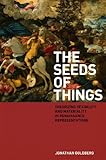The Seeds of Things : Theorizing Sexuality and Materiality in Renaissance Representations / Jonathan Goldberg.
Material type: TextPublisher: New York, NY : Fordham University Press, [2009]Copyright date: ©2009Description: 1 online resource (256 p.)Content type:
TextPublisher: New York, NY : Fordham University Press, [2009]Copyright date: ©2009Description: 1 online resource (256 p.)Content type: - 9780823230662
- 9780823238613
- 820.9/353809031 22
- PR428.S48 G65 2009eb
- online - DeGruyter
| Item type | Current library | Call number | URL | Status | Notes | Barcode | |
|---|---|---|---|---|---|---|---|
 eBook
eBook
|
Biblioteca "Angelicum" Pont. Univ. S.Tommaso d'Aquino Nuvola online | online - DeGruyter (Browse shelf(Opens below)) | Online access | Not for loan (Accesso limitato) | Accesso per gli utenti autorizzati / Access for authorized users | (dgr)9780823238613 |
Browsing Biblioteca "Angelicum" Pont. Univ. S.Tommaso d'Aquino shelves, Shelving location: Nuvola online Close shelf browser (Hides shelf browser)

|

|

|

|

|

|

|
||
| online - DeGruyter A Plausible God : Secular Reflections on Liberal Jewish Theology / | online - DeGruyter The Reinvention of Religious Music : Olivier Messiaen's Breakthrough Toward the Beyond / | online - DeGruyter The Rhetoric of Terror : Reflections on 9/11 and the War on Terror / | online - DeGruyter The Seeds of Things : Theorizing Sexuality and Materiality in Renaissance Representations / | online - DeGruyter Theatricality as Medium / | online - DeGruyter Their Other Side : Six American Women and the Lure of Italy / | online - DeGruyter Toward a Theology of Eros : Transfiguring Passion at the Limits of Discipline / |
Frontmatter -- Contents -- Illustrations -- Acknowledgments -- Introduction -- 1. Conversions: Around Tintoretto -- 2. Turning Toward the World: Lucretius, in Theory -- 3. Spenserian Askesis: The 1590 Faerie Queene -- 4. Margaret Cavendish and Lucy Hutchinson: Writing Matter -- 5. Milton’s Angels -- Notes -- Works Cited -- Index
restricted access online access with authorization star
http://purl.org/coar/access_right/c_16ec
The title of this book translates one of the many ways in which Lucretius names the basic matter from which the world is made in De rerum natura. In Lucretius, and in the strain of thought followed in this study, matter is always in motion, always differing from itself and yet always also made of the same stuff. From the pious Lucy Hutchinson’s all but complete translation of the Roman epic poem to Margaret Cavendish’s repudiation of atomism (but not of its fundamental problematic of sameness and difference), a central concern of this book ishow a thoroughgoing materialism can be read alongside other strains in the thought of the early modern period, particularly Christianity.A chapter moves from Milton’s monism to his angels and their insistent corporeality. Milton’s angels have sex, and, throughout, this study emphasizes the consequences for thinking about sexuality offered by Lucretian materialism. Sameness of matter is not simply a question of same-sex sex, and the relations of atoms in Cavendish and Hutchinson are replicated in the terms in which they imagine marriages of partners who are also their doubles. Likewise, Spenser’s knights in the 1590 Faerie Queene pursue the virtues of Holiness, Temperance, and Chastity in quests that take the reader on a path of askesis of the kind that Lucretiusrecommends and that Foucault studied in the final volumes of his history of sexuality.Although English literature is the book’s main concern, it first contemplates relations between Lucretian matter and Pauline flesh by way of Tintoretto’s painting The Conversion of St. Paul. Theoretical issues raised in the work of Agamben and Badiou, among others, lead to a chapter that takes up the role that Lucretius has played in theory, from Bergson and Marx to Foucault and Deleuze.This study should be of concern to students of religion, philosophy, gender, and sexuality, especially as they impinge on questions of representation.
Mode of access: Internet via World Wide Web.
In English.
Description based on online resource; title from PDF title page (publisher's Web site, viewed 03. Jan 2023)


